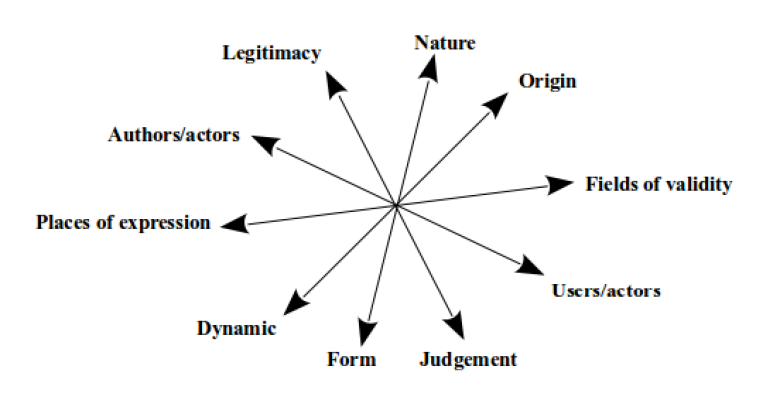Preparing yourself to receive agroecological knowledge
One of the key difficulties when approaching the question of agroecology is that we are confronted, as a trainer and as a learner, with skills that are generally implicit and highly dependent on the context and previous experience of each and every one of us.
These skills are sometimes qualified as â??non-stabilised'. We consider that this is not the appropriate term, in that although they cannot be generalised and applied as one could with a recipe, in any given situation, it still remains that they have a field of validity and expression and that further to this they are operational, pertinent, efficientâ?¦ and therefore relatively stable.
The following diagram is a sort of compass which enables a review of the characteristics of a skill :

- Of which nature is it / are they ? Experience ? Scientific ? Cultural ? Family ? Professional ? What form does it / do they take ? An ensemble of non-formalised practices ? Technical files ? An â??oral' tradition ?
Where do they come from ? What is/are the origin(s) ? Have they evolved over time (dynamic) or have they always been the same ?
- What is / are the place(s) of expression ? Highly localised ? Shared over a territory ? What is / are the field(s) of validity ? A cultural practice ? A sector of production ? A terroir ? A group of peers (neighbours for example) ? A wider professional environment ?
- Who are the authors / actors ? Lost in tradition or more precisely identifiable ? Who are the users ? Individuals ? Groups ?
- Is the skill the object of a form of judgement ? Is it valorised differently in different social environments ? (At school ? With the apprenticeship master ? At home ?) How and through whom is it legitimate ? Is it legitimate implicitly ? Explicitly ?
Several forms of knowledges
Using a simple but potentially explicit analogy, approaching a course on teaching Thales' Theorum does not involve the same educational approach as the acquisition of an agroecological skill. This is why the epistemological nature of the skills in question is important and that the training approach will vary from one situation to another.
-In the first case we are in the presence of a skill which has been stable for several centuries, the origin of which has little influence over its validity, which is wide reaching, and where its places of expression are highly standard and identified. It is of a mathematical nature, fully valorised, confirmed by the scientific community and has a tuition and teachable form.
-In the second case, we are in the presence of a skill which, in most cases, has not been the object of a classic formalisation or conceptualisation. It is â??robust in the act', meaning that it's validity and pertinence are found in a given contextual configuration (social, cultural, geographic, agronomic, ecological...) which is precise and often unique (i.e. the same as where the skill is expressed) and those who use it are the same (and often the only ones) who validate its efficacy. It may be the object of varying levels of adjustment in relation to needs, expectations, individuals or more simply, circumstances â?¦
The relative character of such skills puts learners and teachers/trainers in an uncomfortable position as they are required to question the implicit and explicit outcomes of the learning process.
-In the first case we are in the presence of a skill which has been stable for several centuries, the origin of which has little influence over its validity, which is wide reaching, and where its places of expression are highly standard and identified. It is of a mathematical nature, fully valorised, confirmed by the scientific community and has a tuition and teachable form.
-In the second case, we are in the presence of a skill which, in most cases, has not been the object of a classic formalisation or conceptualisation. It is â??robust in the act', meaning that it's validity and pertinence are found in a given contextual configuration (social, cultural, geographic, agronomic, ecological...) which is precise and often unique (i.e. the same as where the skill is expressed) and those who use it are the same (and often the only ones) who validate its efficacy. It may be the object of varying levels of adjustment in relation to needs, expectations, individuals or more simply, circumstances â?¦
The relative character of such skills puts learners and teachers/trainers in an uncomfortable position as they are required to question the implicit and explicit outcomes of the learning process.
Each of these tools, each of the approaches, represent an active manner of evaluating our virtual dependency on a framework attached to a given epistemology. Virtual dependency, but not total dependency, given that these tools and approaches open a passage within our certainties through which one can explore other dimensions of knowledge and skills and other forms of dialogue situations.
Resources
How to prepare the interviewer to formalize :
@ Aknowledge traditional knowledge
The system of National vocational qualifications (NVQ) offers the possibility for acknowledgement and official recognition of skills and ingenuity which can be considered agroecological knowledge.
Furthering your discovery of training itinerary :
@ How approaching a controversial topic as agroecology with a group of learmers or how Formalising the perception of the concept of agroecology@ Which procedures and techniques to investigate agroecological knowledge or how Investigate
@ Pedagogical Approaches and positions for Promoting integration of agroecological knowledge

